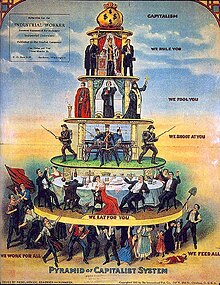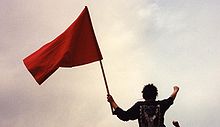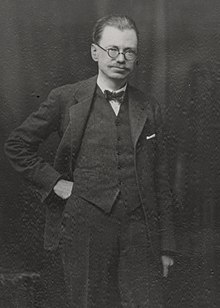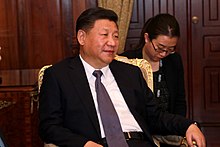Marxist
In addition to the various schools of thought, which emphasise or modify elements of classical Marxism, several Marxian concepts have been incorporated into an array of social theories. This has led to widely varying conclusions. Alongside Marx's critique of political economy, the defining characteristics of Marxism have often been described using the terms "dialectical materialism" and "historical materialism", though these terms were coined after Marx's death and their tenets have been challenged by some self-described Marxists.
As a school of thought, Marxism has had a profound effect on society and global academia. To date, it has influenced many fields, including anthropology, archaeology, art theory, criminology, cultural studies, economics, education, ethics, film theory, geography, historiography, literary criticism, media studies, philosophy, political science, political economy, psychoanalysis, science studies, sociology, theatre, and urban planning.
Overview
Marxism seeks to explain social phenomena within any given society by analysing the material conditions and economic activities required to fulfill human material needs. It assumes that the form of economic organisation, or mode of production, influences all other social phenomena, including broader social relations, political institutions, legal systems, cultural systems, aesthetics and ideologies. These social relations and the economic system form a base and superstructure. As forces of production (i.e. technology) improve, existing forms of organising production become obsolete and hinder further progress. Karl Marx wrote: "At a certain stage of development, the material productive forces of society come into conflict with the existing relations of production or—this merely expresses the same thing in legal terms—with the property relations within the framework of which they have operated hitherto. From forms of development of the productive forces these relations turn into their fetters. Then begins an era of social revolution."
These inefficiencies manifest themselves as social contradictions in society which are, in turn, fought out at the level of class struggle. Under the capitalist mode of production, this struggle materialises between the minority who own the means of production (the bourgeoisie) and the vast majority of the population who produce goods and services (the proletariat). Starting with the conjectural premise that social change occurs due to the struggle between different classes within society who contradict one another, a Marxist would conclude that capitalism exploits and oppresses the proletariat; therefore, capitalism will inevitably lead to a proletarian revolution. In a socialist society, private property—as the means of production—would be replaced by cooperative ownership. A socialist economy would not base production on the creation of private profits but on the criteria of satisfying human needs—that is, production for use. Friedrich Engels explained that "the capitalist mode of appropriation, in which the product enslaves first the producer, and then the appropriator, is replaced by the mode of appropriation of the products that is based upon the nature of the modern means of production; upon the one hand, direct social appropriation, as means to the maintenance and extension of production—on the other, direct individual appropriation, as means of subsistence and of enjoyment."
Marxian economics and its proponents view capitalism as economically unsustainable and incapable of improving the population's living standards due to its need to compensate for the falling rate of profit by cutting employees' wages and social benefits while pursuing military aggression. The socialist mode of production would succeed capitalism as humanity's mode of production through revolution by workers. According to Marxian crisis theory, socialism is not an inevitability but an economic necessity.
Etymology
The term Marxism was popularised by Karl Kautsky, who considered himself an orthodox Marxist during the dispute between Marx's orthodox and revisionist followers. Kautsky's revisionist rival Eduard Bernstein also later adopted the term.
Engels did not support using Marxism to describe either Marx's or his views. He claimed that the term was being abusively used as a rhetorical qualifier by those attempting to cast themselves as genuine followers of Marx while casting others in different terms, such as Lassallians. In 1882, Engels claimed that Marx had criticised self-proclaimed Marxist Paul Lafargue by saying that if Lafargue's views were considered Marxist, then "one thing is certain and that is that I am not a Marxist."
Historical materialism
The discovery of the materialist conception of history, or rather, the consistent continuation and extension of materialism into the domain of social phenomenon, removed two chief defects of earlier historical theories. In the first place, they at best examined only the ideological motives of the historical activity of human beings, without grasping the objective laws governing the development of the system of social relations. ... in the second place, the earlier theories did not cover the activities of the masses of the population, whereas historical materialism made it possible for the first time to study with scientific accuracy the social conditions of the life of the masses and the changes in these conditions.
Society does not consist of individuals, but expresses the sum of interrelations, the relations within which these individuals stand.
— Karl Marx, Grundrisse, 1858
Marxism uses a materialist methodology, referred to by Marx and Engels as the materialist conception of history and later better known as historical materialism, to analyse the underlying causes of societal development and change from the perspective of the collective ways in which humans make their living. Marx's account of the theory is in The German Ideology (1845) and the preface A Contribution to the Critique of Political Economy (1859). All constituent features of a society (social classes, political pyramid and ideologies) are assumed to stem from economic activity, forming what is considered the base and superstructure. The base and superstructure metaphor describes the totality of social relations by which humans produce and re-produce their social existence. According to Marx, the "sum total of the forces of production accessible to men determines the condition of society" and forms a society's economic base.
The base includes the material forces of production such as the labour, means of production and relations of production, i.e. the social and political arrangements that regulate production and distribution. From this base rises a superstructure of legal and political "forms of social consciousness" that derive from the economic base that conditions both the superstructure and the dominant ideology of a society. Conflicts between the development of material productive forces and the relations of production provoke social revolutions, whereby changes to the economic base lead to the superstructure's social transformation.
This relationship is reflexive in that the base initially gives rise to the superstructure and remains the foundation of a form of social organisation. Those newly formed social organisations can then act again upon both parts of the base and superstructure so that rather than being static, the relationship is dialectic, expressed and driven by conflicts and contradictions. Engels clarified: "The history of all hitherto existing society is the history of class struggles. Freeman and slave, patrician and plebeian, lord and serf, guild-master and journeyman, in a word, oppressor and oppressed, stood in constant opposition to one another, carried on uninterrupted, now hidden, now open fight, a fight that each time ended, either in a revolutionary reconstitution of society at large, or in the common ruin of the contending classes."
Marx considered recurring class conflicts as the driving force of human history as such conflicts have manifested as distinct transitional stages of development in Western Europe. Accordingly, Marx designated human history as encompassing four stages of development in relations of production:
- Primitive communism: cooperative tribal societies.
- Slave society: development of tribal to city-state in which aristocracy is born.
- Feudalism: aristocrats are the ruling class, while merchants evolve into the bourgeoisie.
- Capitalism: capitalists are the ruling class who create and employ the proletariat.
While historical materialism has been referred to as a materialist theory of history, Marx did not claim to have produced a master key to history and that the materialist conception of history is not "an historico-philosophic theory of the marche générale, imposed by fate upon every people, whatever the historic circumstances in which it finds itself." In a letter to the editor of the Russian newspaper paper Otechestvennyje Zapiski (1877), he explained that his ideas were based upon a concrete study of the actual conditions in Europe.
Criticism of capitalism

According to the Marxist theoretician and revolutionary socialist Vladimir Lenin, "the principal content of Marxism" was "Marx's economic doctrine." Marx demonstrated how the capitalist bourgeoisie and their economists were promoting what he saw as the lie that "the interests of the capitalist and of the worker are ... one and the same." He believed that they did this by purporting the concept that "the fastest possible growth of productive capital" was best for wealthy capitalists and workers because it provided them with employment.
Exploitation is a matter of surplus labour—the amount of labour performed beyond what is received in goods. Exploitation has been a socioeconomic feature of every class society and is one of the principal features distinguishing the social classes. The power of one social class to control the means of production enables its exploitation of other classes. Under capitalism, the labour theory of value is the operative concern, whereby the value of a commodity equals the socially necessary labour time required to produce it. Under such conditions, surplus value—the difference between the value produced and the value received by a labourer—is synonymous with surplus labour, and capitalist exploitation is thus realised as deriving surplus value from the worker.
In pre-capitalist economies, exploitation of the worker was achieved via physical coercion. Under the capitalist mode of production, workers do not own the means of production and must "voluntarily" enter into an exploitative work relationship with a capitalist to earn the necessities of life. The worker's entry into such employment is voluntary because they choose which capitalist to work for. However, the worker must work or starve. Thus, exploitation is inevitable, and the voluntary nature of a worker participating in a capitalist society is illusory; it is production, not circulation, that causes exploitation. Marx emphasised that capitalism per se does not cheat the worker.
Alienation (German: Entfremdung) is the estrangement of people from their humanity and a systematic result of capitalism. Under capitalism, the fruits of production belong to employers, who expropriate the surplus created by others and generate alienated labourers. In Marx's view, alienation is an objective characterisation of the worker's situation in capitalism—his or her self-awareness of this condition is not prerequisite.
In addition to criticism, Marx has also praised some of the results of capitalism stating that it "has created more massive and more colossal productive forces than have all preceding generations together" and that it "has put an end to all feudal, patriarchal arrangements."
Marx posited that the remaining feudalist societies in the world and forms of socialism that did not conform with his writings would be replaced by communism in the future in a similar manner as with capitalism.
Social classes
Marx distinguishes social classes based on two criteria, i.e. ownership of means of production and control over the labour power of others. Following this criterion of class based on property relations, Marx identified the social stratification of the capitalist mode of production with the following social groups:
- Proletariat: "[T]he class of modern wage labourers who, having no means of production of their own, are reduced to selling their labour power in order to live." The capitalist mode of production establishes the conditions that enable the bourgeoisie to exploit the proletariat as the worker's labour generates a surplus value greater than the worker's wage.
- Lumpenproletariat: the outcasts of society, such as the criminals, vagabonds, beggars, or prostitutes, without any political or class consciousness. Having no interest in national, let alone international, economic affairs, Marx claimed that this specific sub-division of the proletariat would play no part in the eventual social revolution.
- Bourgeoisie: those who "own the means of production" and buy labour power from the proletariat, thus exploiting the proletariat. They subdivide as bourgeoisie and the petite bourgeoisie.
- Petite bourgeoisie: those who work and can afford to buy little labour power (i.e. small business owners, peasants, landlords and trade workers). Marxism predicts that the continual reinvention of the means of production eventually would destroy the petite bourgeoisie, degrading them from the middle class to the proletariat.
- Landlords: a historically significant social class that retains some wealth and power.
- Peasantry and farmers: a scattered class incapable of organising and effecting socioeconomic change, most of whom would enter the proletariat while some would become landlords.
Class consciousness denotes the awareness—of itself and the social world—that a social class possesses and its capacity to act rationally in its best interests. Class consciousness is required before a social class can effect a successful revolution and, thus, the dictatorship of the proletariat.
Without defining ideology, Marx used the term to describe the production of images of social reality. According to Engels, "ideology is a process accomplished by the so-called thinker consciously, it is true, but with a false consciousness. The real motive forces impelling him remain unknown to him; otherwise it simply would not be an ideological process. Hence he imagines false or seeming motive forces."
Because the ruling class controls the society's means of production, the superstructure of society (i.e. the ruling social ideas) is determined by the best interests of the ruling class. In The German Ideology, Marx says that "[t]he ideas of the ruling class are in every epoch the ruling ideas, i.e. the class which is the ruling material force of society, is, at the same time, its ruling intellectual force." The term political economy initially referred to the study of the material conditions of economic production in the capitalist system. In Marxism, political economy is the study of the means of production, specifically of capital and how that manifests as economic activity.
Marxism taught me what society was. I was like a blindfolded man in a forest, who doesn't even know where north or south is. If you don't eventually come to truly understand the history of the class struggle, or at least have a clear idea that society is divided between the rich and the poor, and that some people subjugate and exploit other people, you're lost in a forest, not knowing anything.
This new way of thinking was invented because socialists believed that common ownership of the means of production (i.e. the industries, land, wealth of nature, trade apparatus and wealth of the society) would abolish the exploitative working conditions experienced under capitalism. Through working class revolution, the state (which Marxists saw as a weapon for the subjugation of one class by another) is seized and used to suppress the hitherto ruling class of capitalists and (by implementing a commonly owned, democratically controlled workplace) create the society of communism which Marxists see as true democracy. An economy based on cooperation on human need and social betterment, rather than competition for profit of many independently acting profit seekers, would also be the end of class society, which Marx saw as the fundamental division of all hitherto existing history. Marx saw the fundamental nature of capitalist society as little different from that of a slave society in that one small group of society exploits the larger group.
Through common ownership of the means of production, the profit motive is eliminated, and the motive of furthering human flourishing is introduced. Because the surplus produced by the workers is the property of the society as a whole, there are no classes of producers and appropriators. Additionally, as the state originates in the bands of retainers hired by the first ruling classes to protect their economic privilege, it will wither away as its conditions of existence have disappeared.
Communism, revolution and socialism

According to The Oxford Handbook of Karl Marx, "Marx used many terms to refer to a post-capitalist society—positive humanism, socialism, Communism, realm of free individuality, free association of producers, etc. He used these terms completely interchangeably. The notion that 'socialism' and 'Communism' are distinct historical stages is alien to his work and only entered the lexicon of Marxism after his death."
According to orthodox Marxist theory, overthrowing capitalism by a socialist revolution in contemporary society is inevitable. While the inevitability of an eventual socialist revolution is a controversial debate among many different Marxist schools of thought, all Marxists believe socialism is a necessity. Marxists argue that a socialist society is far better for most of the populace than its capitalist counterpart. Prior to the Russian Revolution, Vladimir Lenin wrote: "The socialisation of production is bound to lead to the conversion of the means of production into the property of society. ... This conversion will directly result in an immense increase in productivity of labour, a reduction of working hours, and the replacement of the remnants, the ruins of small-scale, primitive, disunited production by collective and improved labour." The failure of the 1905 Russian Revolution, along with the failure of socialist movements to resist the outbreak of World War I, led to renewed theoretical effort and valuable contributions from Lenin and Rosa Luxemburg towards an appreciation of Marx's crisis theory and efforts to formulate a theory of imperialism.
Democracy

Karl Marx criticised liberal democracy as not democratic enough due to the unequal socio-economic situation of the workers during the Industrial Revolution which undermines the democratic agency of citizens. Marxists differ in their positions towards democracy. Types of democracy in Marxism include Soviet democracy, New Democracy, Whole-process people's democracy and can include voting on how surplus labour is to be organised. According to democratic centralism political decisions reached by voting in the party are binding for all members of the party.
Schools of thought
Classical
Classical Marxism denotes the collection of socio-eco-political theories expounded by Karl Marx and Friedrich Engels. As Ernest Mandel remarked, "Marxism is always open, always critical, always self-critical." Classical Marxism distinguishes Marxism as broadly perceived from "what Marx believed." In 1883, Marx wrote to his son-in-law Paul Lafargue and French labour leader Jules Guesde—both of whom claimed to represent Marxist principles—accusing them of "revolutionary phrase-mongering" and denying the value of reformist struggle. From Marx's letter derives Marx's famous remark that, if their politics represented Marxism, 'ce qu'il y a de certain c'est que moi, je ne suis pas Marxiste' ('what is certain is that I myself am not a Marxist')."
Libertarian
Libertarian Marxism emphasises the anti-authoritarian and libertarian aspects of Marxism. Early currents of libertarian Marxism, such as left communism, emerged in opposition to Marxism–Leninism.
Libertarian Marxism is often critical of reformist positions such as those held by social democrats. Libertarian Marxist currents often draw from Karl Marx and Friedrich Engels' later works, specifically the Grundrisse and The Civil War in France; emphasising the Marxist belief in the ability of the working class to forge its destiny without the need for a vanguard party to mediate or aid its liberation. Along with anarchism, libertarian Marxism is one of the main currents of libertarian socialism.
Libertarian Marxism includes currents such as autonomism, council communism, De Leonism, Lettrism, parts of the New Left, Situationism, Freudo-Marxism (a form of psychoanalysis), Socialisme ou Barbarie and workerism. Libertarian Marxism has often strongly influenced both post-left and social anarchists. Notable theorists of libertarian Marxism have included Maurice Brinton, Cornelius Castoriadis, Guy Debord, Raya Dunayevskaya, Daniel Guérin, C. L. R. James, Rosa Luxemburg, Antonio Negri, Anton Pannekoek, Fredy Perlman, Ernesto Screpanti, E. P. Thompson, Raoul Vaneigem, and Yanis Varoufakis, the latter claiming that Marx himself was a libertarian Marxist.
Humanist
Marxist humanism was born in 1932 with the publication of Marx's Economic and Philosophic Manuscripts of 1844 and reached a degree of prominence in the 1950s and 1960s. Marxist humanists contend that there is continuity between the early philosophical writings of Marx, in which he develops his theory of alienation, and the structural description of capitalist society found in his later works, such as Capital. They hold that grasping Marx's philosophical foundations is necessary to understand his later works properly.
Contrary to the official dialectical materialism of the Soviet Union and interpretations of Marx rooted in the structural Marxism of Louis Althusser, Marxist humanists argue that Marx's work was an extension or transcendence of enlightenment humanism. Whereas other Marxist philosophies see Marxism as natural science, Marxist humanism reaffirms the doctrine that "man is the measure of all things"—that humans are essentially different to the rest of the natural order and should be treated so by Marxist theory.
Academic

According to a 2007 survey of American professors by Neil Gross and Solon Simmons, 17.6% of social science professors and 5.0% of humanities professors identify as Marxists, while between 0 and 2% of professors in all other disciplines identify as Marxists.
Archaeology
The theoretical development of Marxist archaeology was first developed in the Soviet Union in 1929, when a young archaeologist named Vladislav I. Ravdonikas published a report entitled "For a Soviet history of material culture"; within this work, the very discipline of archaeology as it then stood was criticised as being inherently bourgeois, therefore anti-socialist and so, as a part of the academic reforms instituted in the Soviet Union under the administration of General Secretary Joseph Stalin, a great emphasis was placed on the adoption of Marxist archaeology throughout the country.
These theoretical developments were subsequently adopted by archaeologists working in capitalist states outside of the Leninist bloc, most notably by the Australian academic V. Gordon Childe, who used Marxist theory in his understandings of the development of human society.
Sociology
Marxist sociology, as the study of sociology from a Marxist perspective, is "a form of conflict theory associated with ... Marxism's objective of developing a positive (empirical) science of capitalist society as part of the mobilisation of a revolutionary working class." The American Sociological Association has a section dedicated to the issues of Marxist sociology that is "interested in examining how insights from Marxist methodology and Marxist analysis can help explain the complex dynamics of modern society."
Influenced by the thought of Karl Marx, Marxist sociology emerged in the late 19th and early 20th centuries. With Marx, Max Weber and Émile Durkheim are considered seminal influences in early sociology. The first Marxist school of sociology was known as Austro-Marxism, of which Carl Grünberg and Antonio Labriola were among its most notable members. During the 1940s, the Western Marxist school became accepted within Western academia, subsequently fracturing into several different perspectives, such as the Frankfurt School or critical theory. The legacy of Critical Theory as a major offshoot of Marxism is controversial. The common thread linking Marxism and Critical theory is an interest in struggles to dismantle structures of oppression, exclusion, and domination. Due to its former state-supported position, there has been a backlash against Marxist thought in post-communist states, such as Poland. However, it remains prominent in the sociological research sanctioned and supported by communist states, such as in China.
Economics
Marxian economics is a school of economic thought tracing its foundations to the critique of classical political economy first expounded upon by Karl Marx and Friedrich Engels. Marxian economics concerns itself with the analysis of crisis in capitalism, the role and distribution of the surplus product and surplus value in various types of economic systems, the nature and origin of economic value, the impact of class and class struggle on economic and political processes, and the process of economic evolution. Although the Marxian school is considered heterodox, ideas that have come out of Marxian economics have contributed to mainstream understanding of the global economy. Certain concepts of Marxian economics, especially those related to capital accumulation and the business cycle, such as creative destruction, have been fitted for use in capitalist systems.
Education
Marxist education develops Marx's works and those of the movements he influenced in various ways. In addition to the educational psychology of Lev Vygotsky and the pedagogy of Paulo Freire, Samuel Bowles and Herbert Gintis' Schooling in Capitalist America is a study of educational reform in the U.S. and its relationship to the reproduction of capitalism and the possibilities of utilising its contradictions in the revolutionary movement. The work of Peter McLaren, especially since the turn of the 21st century, has further developed Marxist educational theory by developing revolutionary critical pedagogy, as has the work of Glenn Rikowski, Dave Hill, and Paula Allman. Other Marxists have analysed the forms and pedagogical processes of capitalist and communist education, such as Tyson E. Lewis, Noah De Lissovoy, Gregory Bourassa, and Derek R. Ford. Curry Malott has developed a Marxist history of education in the U.S., and Marvin Gettleman examined the history of communist education. Sandy Grande has synthesised Marxist educational theory with Indigenous pedagogy, while others like John Holt analyse adult education from a Marxist perspective.
Other developments include:
- the educational aesthetics of Marxist education
- Marxist analyses of the role of fixed capital in capitalist education
- the educational psychology of capital
- the educational theory of Lenin
- the pedagogical function of the Communist Party
The latest field of research examines and develops Marxist pedagogy in the postdigital era.
Historiography
Marxist historiography is a school of historiography influenced by Marxism, the chief tenets of which are the centrality of social class and economic constraints in determining historical outcomes. Marxist historiography has contributed to the history of the working class, oppressed nationalities, and the methodology of history from below. Friedrich Engels' most important historical contribution was Der deutsche Bauernkrieg about the German Peasants' War which analysed social warfare in early Protestant Germany regarding emerging capitalist classes. The German Peasants' War indicates the Marxist interest in history from below with class analysis and attempts a dialectical analysis.
Engels' short treatise The Condition of the Working Class in England in 1844 was salient in creating the socialist impetus in British politics. Marx's most important works on social and political history include The Eighteenth Brumaire of Louis Napoleon, The Communist Manifesto, The German Ideology, and those chapters of Capital dealing with the historical emergence of capitalists and proletarians from pre-industrial English society. Marxist historiography suffered in the Soviet Union as the government requested overdetermined historical writing. Notable histories include the History of the Communist Party of the Soviet Union (Bolsheviks), published in the 1930s to justify the nature of Bolshevik party life under Joseph Stalin. A circle of historians inside the Communist Party of Great Britain (CPGB) formed in 1946.
While some members of the group, most notably Christopher Hill and E. P. Thompson, left the CPGB after the 1956 Hungarian Revolution, the common points of British Marxist historiography continued in their works. Thompson's The Making of the English Working Class is one of the works commonly associated with this group. Eric Hobsbawm's Bandits is another example of this group's work. C. L. R. James was also a great pioneer of the 'history from below' approach. Living in Britain when he wrote his most notable work, The Black Jacobins (1938), he was an anti-Stalinist Marxist and so outside of the CPGB. In India, B. N. Datta and D. D. Kosambi are the founding fathers of Marxist historiography. Today, the senior-most scholars of Marxist historiography are R. S. Sharma, Irfan Habib, Romila Thapar, D. N. Jha, and K. N. Panikkar, most of whom are now over 75 years old.
Literary criticism
This article needs additional citations for verification. (June 2024) |
Marxist literary criticism is a loose term describing literary criticism based on socialist and dialectic theories. Marxist criticism views literary works as reflections of the social institutions from which they originate. According to Marxists, even literature is a social institution with a specific ideological function based on the background and ideology of the author. Marxist literary critics include Mikhail Bakhtin, Walter Benjamin, Terry Eagleton, and Fredric Jameson.
Aesthetics
This section needs additional citations for verification. (June 2024) |
Marxist aesthetics is a theory of aesthetics based on or derived from the theories of Karl Marx. It involves a dialectical and materialist, or dialectical materialist, approach to the application of Marxism to the cultural sphere, specifically areas related to taste, such as art and beauty, among others. Marxists believe that economic and social conditions, and especially the class relations that derive from them affect every aspect of an individual's life, from religious beliefs to legal systems to cultural frameworks. Some notable Marxist aestheticians include Anatoly Lunacharsky, Mikhail Lifshitz, William Morris, Theodor W. Adorno, Bertolt Brecht, Herbert Marcuse, Walter Benjamin, Antonio Gramsci, Georg Lukács, Ernst Fischer, Louis Althusser, Jacques Rancière, Maurice Merleau-Ponty, and Raymond Williams.
History
Karl Marx and Friedrich Engels

Marx addressed the alienation and exploitation of the working class, the capitalist mode of production and historical materialism. He is famous for analysing history in terms of class struggle, summarised in the initial line introducing The Communist Manifesto (1848): "The history of all hitherto existing society is the history of class struggles."
Together with Marx, Engels co-developed communist theory. Marx and Engels first met in September 1844. Discovering that they had similar views of philosophy and socialism, they collaborated and wrote works such as Die heilige Familie (The Holy Family). After Marx was deported from France in January 1845, they moved to Belgium, which permitted greater freedom of expression than other European countries. In January 1846, they returned to Brussels to establish the Communist Correspondence Committee.
In 1847, they began writing The Communist Manifesto (1848), based on Engels' The Principles of Communism. Six weeks later, they published the 12,000-word pamphlet in February 1848. In March, Belgium expelled them, and they moved to Cologne, where they published the Neue Rheinische Zeitung, a politically radical newspaper. By 1849, they had to leave Cologne for London. The Prussian authorities pressured the British government to expel Marx and Engels, but Prime Minister Lord John Russell refused.
After Marx died in 1883, Engels became the editor and translator of Marx's writings. With his Origins of the Family, Private Property, and the State (1884)—analysing monogamous marriage as guaranteeing male social domination of women, a concept analogous, in communist theory, to the capitalist class's economic domination of the working class—Engels made intellectually significant contributions to feminist theory and Marxist feminism.



